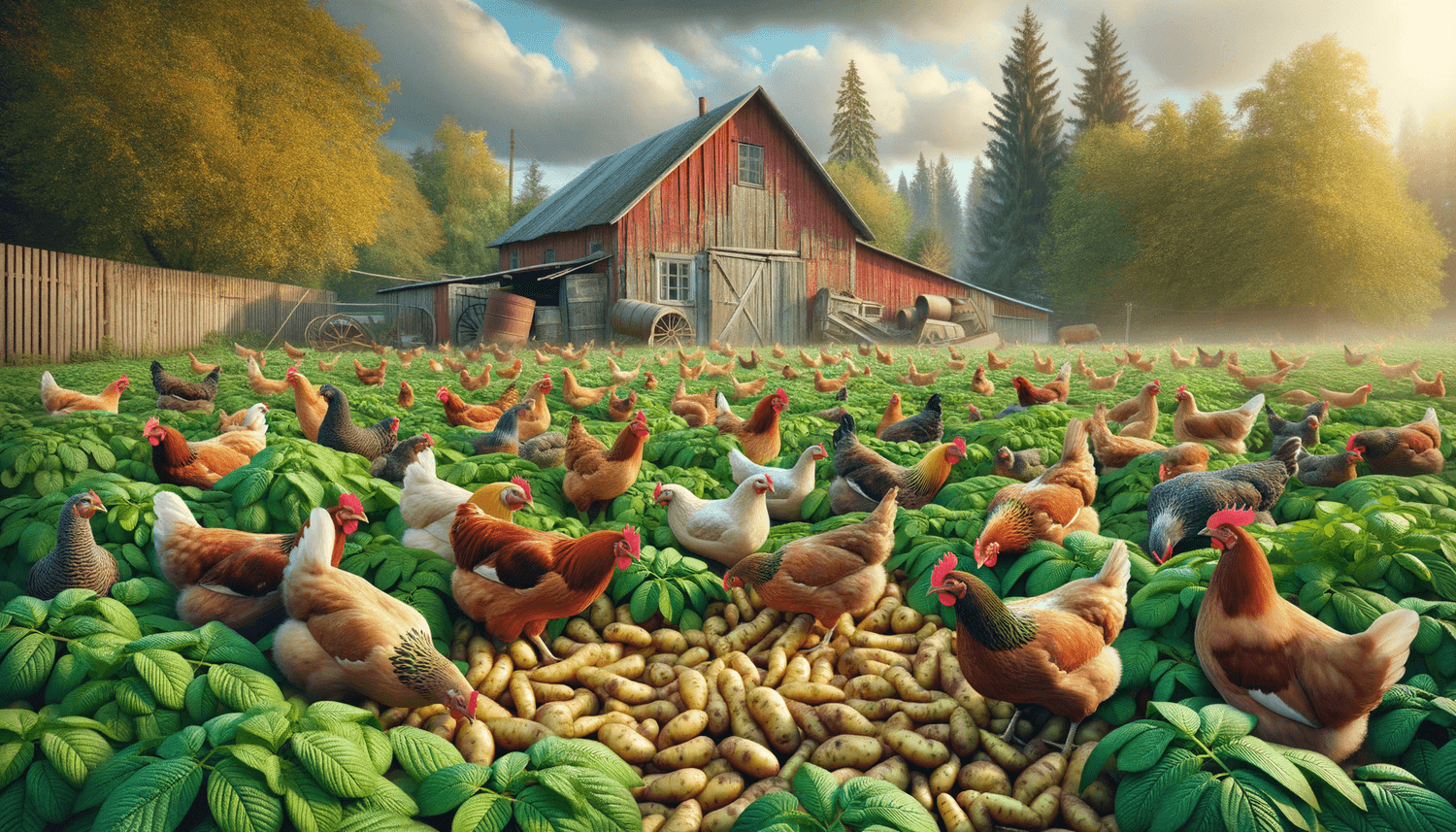Cluck, cluck! If you’ve ever found yourself wondering, “Can my feathery friends enjoy a tasty treat of potato leaves?”, then you’ve come to the right place! In this amusing and informative blog post, we will venture into the leafy world of potatoes and uncover whether or not chickens can eat these greens. As dedicated backyard chicken enthusiasts, we know the importance of providing our charming cluckers with a balanced and nutritious diet, and we’re eager to dish out the scoops on potential benefits, risks, and how to serve up this intriguing snack. So, fluff your feathers, and let’s take a peck at this spud-tacular question!
Can chickens eat potato leaves?
No, chickens should not eat potato leaves as they are unsafe for consumption. The leaves, along with the stems and green parts of the potato plant, contain a toxic substance called solanine, which can be harmful to chickens and lead to health issues such as gastrointestinal distress or more severe problems.
A balanced diet for backyard chickens
Just like us humans, chickens require a balanced diet to ensure they’re in tip-top shape and producing delicious eggs. Providing your feathery friends with the right nutrition is essential for their well-being, and the ideal diet primarily consists of high-quality chicken feed. This formidable foundation for your chickens’ sustenance should make up roughly 80-90% of their daily intake. Chicken feed is nutritionally balanced to support growth, egg production, and overall health.
Of course, life would be dull without a little variety, and the same goes for our plucky pals! The remaining 10-20% of a chicken’s diet can include scrumptious treats like fruits and vegetables. These delightful additions can offer entertainment, extra nutrients, and a healthy foraging experience for your free-ranging flock. Just remember: when it comes to treats, moderation is key, and it’s important to ensure they are suitable and safe for consumption. Happy pecking!
Nutritional value of potato leaves for chickens.
While there is no denying that some fruits and vegetables provide excellent nutritional value and benefits for chickens, unfortunately, this is not the case with potato leaves. As mentioned earlier, chickens should not eat potato leaves due to the presence of solanine, a toxic substance found in the plant’s leaves, stems, and green parts. Solanine can have harmful effects on your chickens, leading to gastrointestinal distress or even more severe health issues.
Even if we were to neglect the inherent solanine toxicity concern, potato leaves are not a rich source of vitamins and minerals for chickens. Consequently, feeding potato leaves to your flock would do more harm than good. It is always wise to be aware of which treats are safe and beneficial for your backyard chickens and avoid feeding them potentially toxic or nutritionally deficient foods. Remember, their well-being and egg production depend on the care and attention you provide!
Nutrition table of potato leaves for chickens.
| Information | Description |
|---|---|
| Nutritional Value | No significant nutritional value for chickens |
| Suggested Serving Size | Not applicable, as potato leaves should not be fed to chickens |
| Safe Feeding Practices | Not safe to feed potato leaves to chickens |
| Preparation | No specific method, as potato leaves are not suitable for chickens |
| Potential Risks | Toxicity due to solanine content, causing gastrointestinal distress and other health issues |
| Hydration | Not applicable, as potato leaves should not be fed to chickens |
| Digestion | Potential digestive issues due to solanine toxicity |
| Seasonal Availability | Available during the growing season of potatoes, but not recommended for feeding |
| Other Benefits | No known benefits for chickens, as potato leaves should be avoided |
Alternative Treat Options for Chickens
Now that we’ve established that potato leaves are not suitable for chickens, you might be wondering what other treats you can safely provide for your flock. Worry not, there is an abundant variety of nutritious and delicious treats your backyard birds will surely love! Below are some great options:
- Leafy greens like lettuce, kale, and spinach
- Fruits such as berries, apples, and melons (make sure to remove seeds and pits)
- Vegetables, including carrots, peas, and broccoli
- Mealworms or black soldier fly larvae for an extra protein boost
Remember to introduce new treats gradually and in moderation to avoid upsetting your flock’s regular diet and digestion. Always ensure fresh water is readily available when feeding your chickens any treat items.
Important Tips on Feeding Chickens
Feeding your chickens appropriately and meeting their dietary needs is crucial, as it directly affects their health and overall well-being. To help your flock thrive, consider these essential feeding tips:
- Avoid feeding or limiting processed or high-salt foods, as these may damage the kidneys or have negative health implications.
- Remove any leftover treats from the chicken coop to maintain cleanliness and prevent mold growth, keeping the potential for diseases to a minimum.
- Before offering human foods, ensure they are safe for chicken consumption and free from additives or artificial flavorings that may be harmful.
- Monitor your flock’s health and egg production, as changes might signify a dietary deficiency or health issue that requires attention.
By mindfully providing a balanced and varied diet, along with ensuring proper husbandry, your backyard chickens will enjoy a happy, healthy life and reward you with delicious eggs.

















